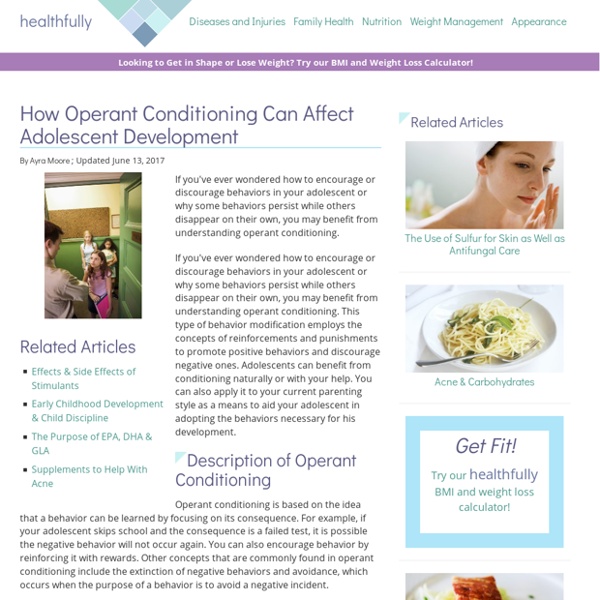Teens May Learn Best with Positive Reinforcement
A new study finds that adolescents focus on rewards and are less able to learn to avoid punishment or consider the consequences of alternative actions. University College-London investigators compared how adolescents and adults learn to make choices based on the available information. Investigators tracked the way in which 18 volunteers aged 12-17 and 20 volunteers aged 18-32 completed tasks in which they had to choose between abstract symbols. Each symbol was consistently associated with a fixed chance of a reward, punishment, or no outcome. As the trial progressed, participants learned which symbols were likely to lead to each outcome and adjusted their choices accordingly. Adolescents and adults were equally good at learning to choose symbols associated with reward, but adolescents were less good at avoiding symbols associated with punishment.
How Negative Punishment Works
Negative punishment is an important concept in B. F. Skinner's theory of operant conditioning. In behavioral psychology, the goal of punishment is to decrease unwanted behavior. In the case of negative punishment, it involves taking something good or desirable away to reduce the occurrence of a particular behavior.
Ministry of Social and Family Development
MSF supports parents and the challenges they face. MSF also encourages parents to develop parenting skills necessary to build strong, stable families. Development Support and Learning SupportThe Development Support (DS) and Learning Support (LS) programmes provide development support and learning support for children with mild developmental needs so they can make a smoother transition to primary school.BeaconWorks ProgrammeHaving serious and persistent problems disciplining your children?
Statistics on effects of adolescent rebellions
Although no parent wants to think about tough topics, like teen suicide, teen pregnancy, and teen violence, those issues are real among many of today's teenagers. It's important for parents to be informed about the issues many teenagers are facing. Even if your teen never experiences any serious problems first-hand, they'll likely have friends and classmates who do.
Discipline strategies for teenagers
Around the time that your child starts secondary school, you might need to adjust your approach to discipline. Effective discipline for teenagers focuses on setting agreed limits and helping teenagers work within them. Teenage discipline: the basics Discipline isn’t about punishment. It’s about teaching children appropriate ways to behave. For teenagers, discipline is about agreeing on and setting appropriate limits and helping them behave within those limits.
Reinforcement and Punishment
Learning Objectives Explain the difference between reinforcement and punishment (including positive and negative reinforcement and positive and negative punishment)Define shapingDifferentiate between primary and secondary reinforcers In discussing operant conditioning, we use several everyday words—positive, negative, reinforcement, and punishment—in a specialized manner.
Want happy and well-educated children? Try this
Towards the end of the 20th century, thanks to Martin Seligman, psychology focused on studying phenomena which, until then, had been relegated to the background, such as creativity, happiness, and emotional intelligence. This current of thought has permeated the science of psychology in the 21st century, affecting education as well, offering concrete suggestions about how to educate our children. What is positive behavior support, and how can we apply it to the education of our children? The essence of this new focus is education using more positive techniques that create an atmosphere of wellbeing in the home — an environment that stimulates our children to behave well and give the best of themselves. To achieve this, we need to be patient and flexible to facilitate learning. We need to give our children the tools they need to form their identity and self-esteem.
How to Reward Your Teen for Good Behavior
Teenagers are young adults who are trying to learn the ways of the world. When they do something great at school or at home or simply make a healthy decision, parents can give them a reward. The reward does not have to be money, but it is a nice way to say "thank you" or "I'm proud of you." Teens need this positive reinforcement because it shows them that they are on the right track.1 It is also a good life lesson that you can pass on: good things happen to good people. When Do Teenagers Deserve a Reward? A teen can earn a reward for positive behavior or by changing negative behavior.1 While you should not feel that you have to "pay" for every good thing your teen does, reinforcement of good behavior will help ensure that it continues.
Rewarding behavior is key to parenting teens
Citation: Palminteri S, Kilford EJ, Coricelli G, Blakemore S-J (2016) The Computational Development of Reinforcement Learning during Adolescence. PLoS Comput Biol 12(6): e1004953. Editor: Jill X.
LOST in Continuous reinforcement
A few years back, during my sophomore year of college, I discovered the TV show LOST. Like millions of other Americans, it wasn’t long before I became hooked. Lucky for me, LOST had been showing for long enough that almost all the episodes were instantly available on Netflix.
Positive And Negative Reinforcement (Examples, Punishment) - Parenting For Brain
Reinforcement and punishment are often used as parenting tools to modify children’s behavior. Let’s review the difference between positive reinforcement and negative reinforcement, and the difference in outcomes between them. The Difference Between Positive And Negative Reinforcement




Operant Conditioning can go a long way in helping parents shape the behavioural habits of children early. If it only becomes an intentional exercise during adolescence then it can be influential at changing behaviours and averting delinquent risks. by lawrenztan Sep 24